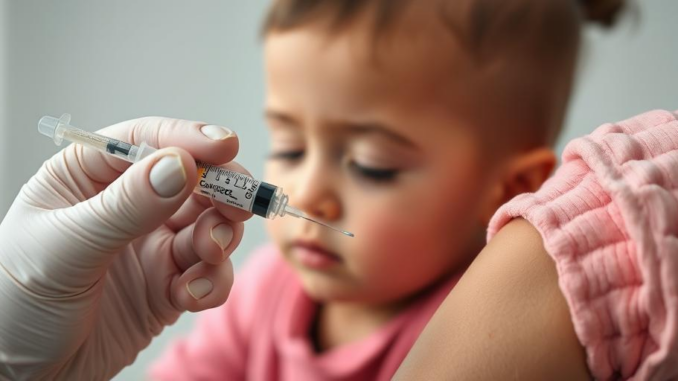
Summary
A recent study reveals that 15% of children in the US receive at least one vaccine outside the recommended timeframe. This raises concerns about potential impacts on vaccine effectiveness and overall public health. Exploring the reasons behind this trend and potential solutions are crucial for improving pediatric care and protecting community health.
Main Story
Okay, so, a new study just dropped in Pediatrics, and it’s got me thinking. Turns out, a significant number of kids in the U.S. aren’t getting their shots on schedule – we’re talking about 15.4% receiving at least one vaccine dose outside the recommended age range. Fifteen percent, that’s not small, is it? I mean, you’d assume that most kids are sticking to the schedule, but clearly, that’s not the case.
And, it’s not just a small deviation either. The study looked at data from 2011 to 2020 and they found that the rotavirus vaccine was the one most often given late. Now, they’re still figuring out all the implications of this, but what we do know is that the schedule isn’t just arbitrary, right? It’s designed to provide the most effective protection when kids need it most. So, when you start deviating, that could leave them, well, vulnerable during certain developmental periods.
Why is this happening though, right? Well, that’s what I was wondering, too. They noted that having multiple healthcare providers is a contributing factor, which, honestly, makes perfect sense. Think about it – if your child is bouncing between doctors, or specialists, it’s easy for records to get mixed up or for someone to miss something. Also, interstate moves also play a part, it turns out. When families move to a new state, the whole vaccination record thing might be different, and it can cause delays or gaps in immunizations. I remember trying to transfer my own records once, it was a total mess. It took them weeks to catch up!
So, what does this mean for us? For starters, it highlights the importance of making sure that records are always accurate, and that doctors and parents are communicating really well about it. Families, you really should be talking to your health provider to address concerns, and make sure your kids are getting shots at the right times. You can’t just assume everything is fine without checking. Also, and this is a big one in my opinion, we really need to look at the system. Streamlining records across states and different healthcare systems could make a massive difference. On top of that, public health campaigns that help parents understand why its important to vaccinate their kids on time would be a good idea.
Switching gears slightly, its worth pointing out that the broader landscape of pediatric care is actually seeing some amazing advancements, things we would only have dreamt of a few years ago. Telemedicine for instance, is making care so much more accessible, especially for people in underserved areas or those who find it difficult to travel. There are also mobile apps, for health now, and they help parents keep track of everything, and keep them up to date with things like vaccinations. We are also using what they call “Precision Medicine,” in fields like oncology which allows them to tailor treatments based on individual genetic and environmental factors. It’s like, next-level care. And let’s not forget about the work they are doing with behavioral and cognitive therapies, that really make a difference in kids’ mental health.
Even routine care is getting an upgrade, non-invasive screening tools and wearable tech…it’s all quite impressive, and these are making it easier to identify potential health issues early on. These are all great steps, but it’s also obvious that problems like missed vaccines need a multi-pronged approach – it’s not just one thing that’s going to fix it. Ultimately, what it shows us, I think, is that when we bring together healthcare providers, families, and public health initiatives, we can really make a difference in kids’ health. And who doesn’t want that?


A fifteen percent vaccination slip rate? Sounds like we need to treat doctor’s offices like airline check-in: arrive early, or risk being bumped to next available slot.
That’s an interesting analogy! Treating appointments like airline check-ins highlights the need for punctuality and planning in healthcare. Perhaps offering reminders or incentives for timely vaccinations could improve adherence to the schedule, further exploring options would be beneficial.
Editor: MedTechNews.Uk
Thank you to our Sponsor Esdebe – https://esdebe.com
The study’s findings on the rotavirus vaccine being most often delayed are concerning. Understanding the specific factors contributing to this delay, compared to other vaccines, warrants further investigation. Perhaps targeted interventions are needed to address this specific vaccine.
That’s a crucial point! It’s interesting that the rotavirus vaccine seems to be lagging. Diving deeper into the reasons behind this delay compared to other vaccines definitely warrants further investigation. Understanding the ‘why’ could be key to developing effective, targeted solutions.
Editor: MedTechNews.Uk
Thank you to our Sponsor Esdebe – https://esdebe.com
Fifteen percent vaccine slippage? It’s like they’re playing vaccine limbo, how low can you go…with the schedule!
Haha, that’s a great analogy! The “vaccine limbo” visual really highlights the issue. It definitely underscores the importance of proactive outreach to families to help them stay on track. Perhaps more accessible resources can act as guardrails, so we don’t keep seeing how low we can go!
Editor: MedTechNews.Uk
Thank you to our Sponsor Esdebe – https://esdebe.com
The study’s point about multiple providers impacting schedules raises interesting questions about record portability and interoperability. Could a universal, secure digital immunization record, accessible across states and providers, significantly reduce these delays and improve overall adherence?